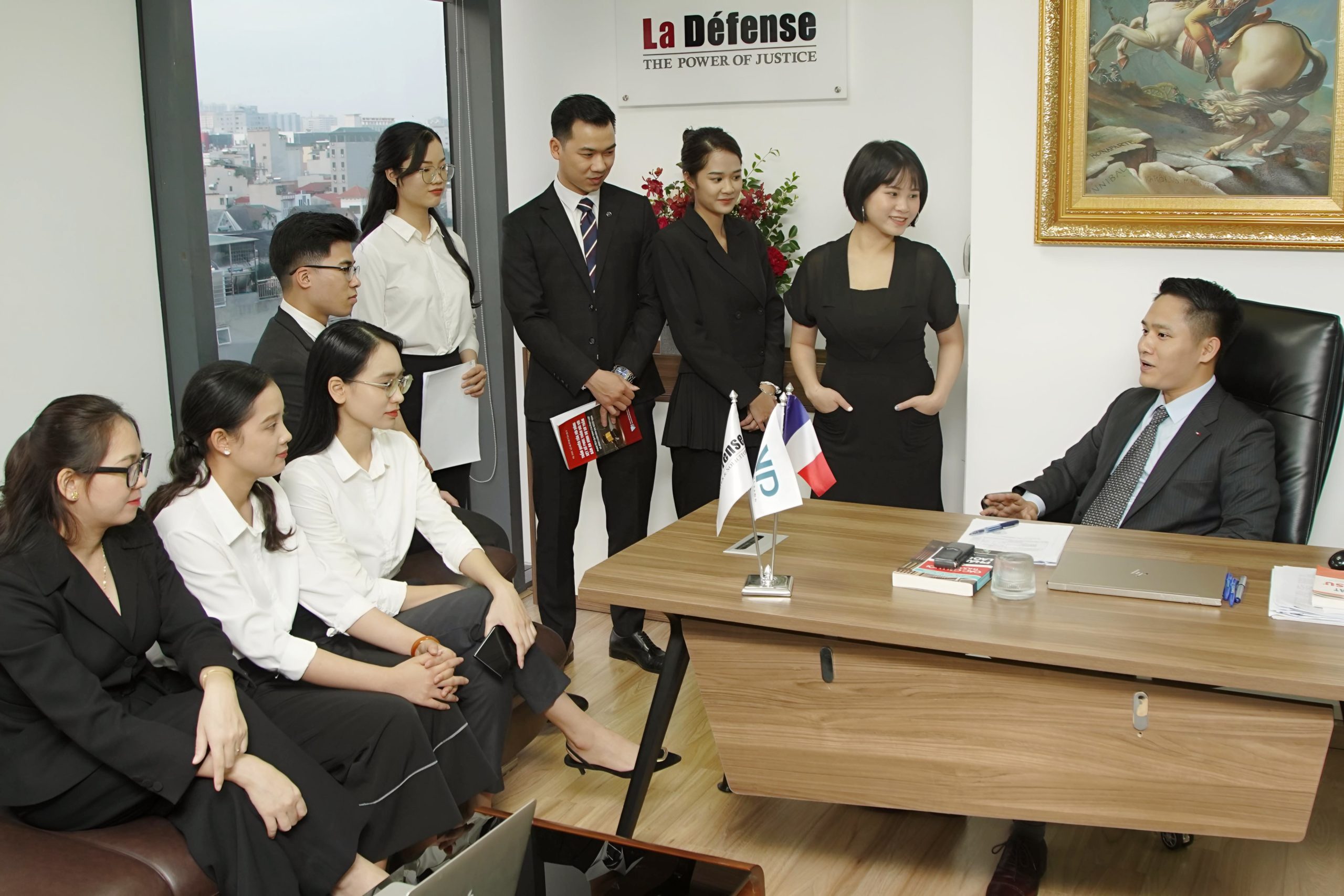In recent years, international trade disputes have become increasingly complex and are on the rise. This trend is primarily driven by Vietnam’s deeper integration into the global economy, particularly through the signing of free trade agreements (FTAs) with major partners. While this expansion offers significant opportunities for businesses, it also brings considerable challenges, especially in resolving disputes arising from international commercial transactions.
How Do Lawyers Assess The Current State Of International Trade Disputes?
Mr. Luu Tien Dung, Chief of Office at La Défense Law Firm, shared his insights on the current state of international trade disputes: According to a report by the Vietnam Chamber of Commerce and Industry (VCCI), the number of international trade disputes involving Vietnam has increased by approximately 15% over the past three years, particularly in sectors such as mergers and acquisitions (M&A), construction, and intellectual property. These disputes not only result in financial losses but also damage the reputation of Vietnamese enterprises in the global market.
In the M&A sector, disputes primarily arise from asset valuation issues, contractual amendments, or a party’s failure to fulfill its commitments. Between 2020 and 2023, approximately 25% of international arbitration cases were related to M&A, with notable cases such as Vingroup’s M&A transactions with international partners. These disputes often stemmed from disagreements over profit-sharing terms and control rights post-merger. One particular case had to be resolved through international arbitration, lasting nearly a year and incurring substantial costs for both parties.
The construction industry is also a sector prone to international trade disputes. According to the International Court of Arbitration, construction disputes account for approximately 18% of total international arbitration cases. These disputes frequently involve issues such as failure to meet deadlines, quality violations, or delayed payments. A notable case was the dispute between Coteccons and a South Korean partner over a construction project in Vietnam. The conflict arose due to unclear agreements on construction timelines and payment processes, necessitating resolution through international arbitration.
Intellectual property (IP) disputes have also surged in recent years, coinciding with rapid advancements in technology and e-commerce, particularly in the technology and pharmaceutical sectors. According to the World Intellectual Property Organization (WIPO), the number of IP-related lawsuits increased by 20% between 2020 and 2023. These disputes typically involve copyright, trademark, or patent infringements. One prominent case was the dispute between VinFast and a European partner over brand ownership and trademark rights in international markets. Although the matter was settled through negotiation, the associated costs severely impacted the company’s finances and reputation.

Mr. Luu Tien Dung identified several key causes behind the increasing number of international trade disputes and fraudulent activities:
Lack of Understanding of International Legal Regulations
One of the primary causes is the lack of understanding of international legal regulations and differences in legal systems across countries. Although Vietnamese businesses are increasingly engaging in international transactions and collaborations, their knowledge of international law—particularly regarding rights protection, dispute resolution, and legal procedures—remains limited. As a result, many enterprises enter international transactions without fully recognizing potential legal risks or adequately preparing protective measures in their contracts. This lack of preparedness makes them vulnerable to fraud and disputes without a solid legal defense.
Deficiencies in Contract Drafting
A common cause of international trade disputes is the failure to draft and negotiate contracts properly. In international transactions, contracts serve as the primary legal safeguard for all parties involved. However, many Vietnamese businesses do not prioritize clarifying essential terms such as dispute resolution mechanisms, payment methods, intellectual property rights, and protective measures in case of contract breaches. This creates legal loopholes, making disputes more likely when disagreements arise.
For example, in a dispute between a Vietnamese exporter and a Chinese partner over product quality, the contract lacked clear provisions on dispute resolution mechanisms and protections for the seller. Consequently, the Vietnamese enterprise suffered significant losses, as it was unable to recover the payments already made.
Fraud and International Fraudulent Activities
With the expansion of global trade, fraudulent activities and business scams have also increased, particularly affecting enterprises with limited experience in international transactions. Fraud commonly occurs in transactions involving assets, services, or sales contracts, where one party may provide false information or fail to fulfill contractual commitments. Many Vietnamese businesses, due to a lack of knowledge or misplaced trust in their partners, fail to conduct necessary due diligence, resulting in them becoming victims of fraud.
A typical case involves a fraud incident in the export sector between a Vietnamese enterprise and a partner from the United States. After signing the contract and making a substantial advance payment for goods, the Vietnamese company discovered that the partner was unable to deliver the goods as promised. Due to the absence of clear contractual terms regarding dispute resolution and rights protection, the Vietnamese company was unable to demand a refund or compensation.
Access to and Utilization of International Dispute Resolution Mechanisms
Although dispute resolution mechanisms such as international arbitration and mediation can help resolve legal issues arising in international transactions, not all Vietnamese enterprises have a thorough understanding of these methods. In reality, many Vietnamese businesses fail to utilize dispute resolution mechanisms effectively, leading to prolonged disputes and escalating costs. A lack of knowledge about arbitration procedures, as well as improper selection of international arbitration institutions, can create significant challenges for businesses in protecting their interests.
Lack of Legal Preparation and Understanding of International Business Culture
Beyond legal factors, another critical aspect is the lack of understanding of international business culture and working styles. Vietnamese enterprises sometimes fail to recognize cultural differences in communication, negotiation, and business dealings between countries. A lack of cultural preparation can lead to transaction breakdowns and disputes, especially in multicultural business environments.

Mr. Lưu Tiến Dũng offers several key recommendations to help Vietnamese enterprises prevent and resolve international trade disputes:
As a law firm specializing in international commercial dispute resolution in the Asia-Pacific region, we would like to share several important recommendations for Vietnamese entrepreneurs and businesses to avoid disputes when working with foreign partners:
First, a fundamental factor in avoiding disputes is carefully selecting business partners. Companies must conduct thorough due diligence on their partners’ credibility and financial capacity. An unreliable partner or one with a history of disputes can pose significant risks, jeopardizing long-term business relationships.
Second, contractual clarity is essential. A contract serves as the legal foundation that ensures the rights and obligations of both parties throughout the cooperation. Contractual terms must be explicitly detailed, particularly regarding the scope of work, payment terms, and the rights and responsibilities of each party. This is especially important in international contracts, where differences in legal systems and business cultures can lead to misunderstandings and conflicts.
One of the most crucial contractual elements is the dispute resolution clause. In an international context, where each country has its own legal framework and dispute resolution procedures, pre-determining the method and forum for resolving disputes is critical. Companies must clearly define where and how disputes will be resolved—whether through international arbitration or the courts of a specific country. Choosing an appropriate dispute resolution mechanism not only saves time and costs but also ensures optimal protection of business interests.
Additionally, businesses must familiarize themselves with the legal regulations and business culture of the countries they engage with. Every country has distinct commercial laws, and a lack of understanding of these regulations can result in contract breaches or even disputes. Therefore, acquiring knowledge of the legal system in the partner’s country is of utmost importance.
In the event of a dispute, the first step a company should take is to document and formally notify all relevant parties about the issue. This ensures that sufficient evidence and documentation are available to support the company’s claims. Businesses must ensure that all relevant information and evidence regarding the dispute are properly preserved and readily available when needed.
Furthermore, alternative dispute resolution methods such as arbitration and mediation are becoming increasingly popular in the international business environment. These methods not only help reduce costs and save time but also preserve business relationships, which are crucial in cross-border collaborations. Companies should consider utilizing these mechanisms as soon as a dispute arises rather than allowing tensions to escalate.
Finally, one of the most critical factors in safeguarding business interests is engaging professional legal counsel from the outset of a dispute. Lawyers can help businesses understand their rights and obligations while developing appropriate strategies for effective dispute resolution. Legal support not only prevents procedural errors but also facilitates swift and successful dispute resolution.
However, businesses must also recognize that flexibility and negotiation skills can sometimes lead to quicker and more effective dispute resolution than prolonged legal battles. Being adaptable in finding reasonable solutions can help businesses maintain partnerships and avoid unnecessary losses in the future.
DOWNLOAD THE PUBLICATION HERE.
Read more at:
- The Impact of the Amended Investment Law on Dispute Resolution
- Real Estate Disputes in Vietnam
- Cross-Border Investment Disputes

